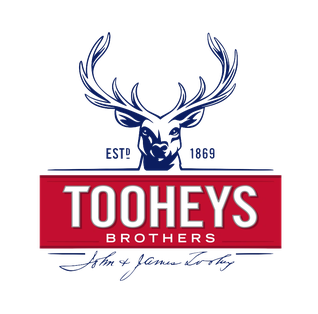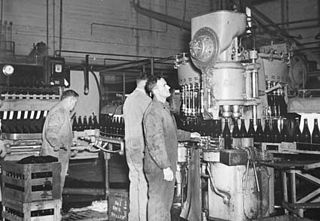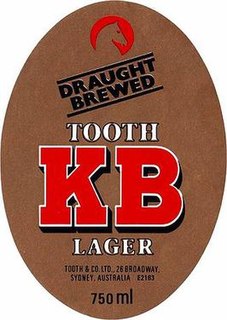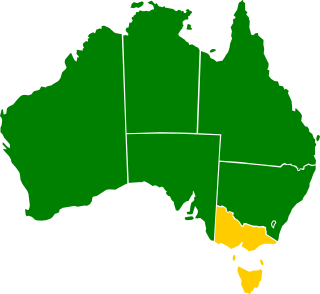
Tooheys is a brewery in the suburb of Lidcombe, in Sydney, Australia. It produces beers and ciders under the Tooheys and Hahn Brewery trademarks, and is part of the Lion beverages group which was acquired by the Japanese Kirin Company in 2009.

A reusable bottle is a bottle that can be reused, as in the case as by the original bottler or by end-use consumers. Reusable bottles have grown in popularity by consumers for both environmental and health safety reasons. Reusable bottles are one example of reusable packaging.

The Oregon Bottle Bill is a container-deposit legislation enacted in the U.S. state of Oregon in 1971 that went into effect in October 1972. It was the first such legislation in the United States. It was amended in 2007 and 2011. It requires applicable beverages in applicable sizes in glass, plastic or metal cans or bottles sold in Oregon to be returnable with a minimum refund value. The refund value was initially 5 cents until April 1, 2017, when it increased to 10 cents. The Oregon Legislature has given the Oregon Liquor Control Commission the authority to administer and enforce the Bottle Bill. For COVID-19 related reasons, from March 15, 2020 until July 5, 2021 enforcement was suspended a few times and retailers were allowed to limit acceptance hours. Oregon Beverage Recycling Cooperative (OBRC), a private cooperative owned by retailers and beverage distributors, administers the collection and transportation of returned containers and keeps all the unclaimed deposits. Materials from returned containers are sold by the OBRC and proceeds are handed out to beverage distributors. In 2022, the bottle bill was expanded to include canned wine, which will become eligible for redemption on July 1, 2025.

The Swan Brewery is a brewing company, whose brewery was located in Perth, Western Australia.

Castlemaine Perkins is a brewery at 185 Milton Road, Milton, Brisbane, Queensland, Australia. It is a wholly owned entity of the Japanese-controlled Lion company. Operations began in 1878 and continue today. Castlemaine Perkins is the home of the XXXX beer brand.

Container-deposit legislation is any law that requires the collection of a monetary deposit on beverage containers at the point of sale and/or the payment of refund value to the consumers. When the container is returned to an authorized redemption center, or retailer in some jurisdictions, the deposit is partly or fully refunded to the redeemer. It is a deposit-refund system.

Beer arrived in Australia at the beginning of British colonisation. In 2004 Australia was ranked fourth internationally in per capita beer consumption, at around 110 litres per year; although, the nation ranked considerably lower in a World Health Organization report of alcohol consumption per capita of 12.2 litres. Lager is by far the most popular type of beer consumed in Australia.

Glass recycling is the processing of waste glass into usable products. Glass that is crushed or imploded and ready to be remelted is called cullet. There are two types of cullet: internal and external. Internal cullet is composed of defective products detected and rejected by a quality control process during the industrial process of glass manufacturing, transition phases of product changes and production offcuts. External cullet is waste glass that has been collected or reprocessed with the purpose of recycling. External cullet is classified as waste. The word "cullet", when used in the context of end-of-waste, will always refer to external cullet.

Tooth and Co was the major brewer of beer in New South Wales, Australia. The company owned a large brewery on Broadway in Sydney from 1835 until 1985, known as the Kent Brewery. It was historically one of Australia's oldest companies, having been established as a partnership in 1835 and listed on the then Sydney Stock Exchange in July 1961. The brand has undergone a revival in 2015.

Bath v Alston Holdings Pty Ltd, is a High Court of Australia case that discusses the application of the freedom of interstate trade, as specified in Section 92 of the Constitution of Australia. This case followed the unanimous decision of Cole v Whitfield, regarding the interpretation of section 92 as about free trade as opposed to individual rights.

Barley Marketing Board (NSW) v Norman, is a High Court of Australia case that deals with the question of whether State-run marketing boards are permissible under Section 92 of the Constitution of Australia, which deals with the freedom of interstate trade and commerce.

In Kruger v Commonwealth, decided in 1997, also known as the Stolen Generation Case, the High Court of Australia rejected a challenge to the validity of legislation applying in the Northern Territory between 1918 and 1957 which authorised the removal of Aboriginal children from their families. The majority of the bench found that the Aboriginals Ordinance 1918 was beneficial in intent and had neither the purpose of genocide nor that of restricting the practice of religion. The High Court unanimously held there was no separate action for a breach of any constitutional right.

Nationwide News Pty Ltd v Wills is a High Court of Australia case that deals with a number of issues regarding the Australian Constitution, including the Express right free interstate trade and commerce, the implied freedom of political communication, and the role of proportionality.
California Redemption Value (CRV), also known as California Refund Value, is a regulatory fee paid on recyclable beverage containers in the U.S. state of California. The fee was established by the California Beverage Container Recycling and Litter Reduction Act of 1986 and further extended to additional beverage types in California State Senate Bill No. 1013, signed into law on September 28, 2022 and taking effect on January 1, 2024; since 2010 the program has been administered by the Cal/EPA California Department of Resources Recycling and Recovery (CalRecycle).

The Tennessee Bottle Bill is citizen-supported container-deposit recycling legislation, which if enacted will place a 5-cent deposit on beverage containers sold in Tennessee. The bill applies to containers made of aluminum/bimetal, glass or any plastic, containing soft drinks, beer/malt beverages, carbonated or non-carbonated waters, plain or flavored waters, energy drinks, juices, iced teas or iced coffees. Milk/dairy, nutritional drinks and wine and spirits are not included in the program.

There are ten U.S. states with container deposit legislation, popularly called "bottle bills" after the Oregon Bottle Bill, the first such legislation passed.
The Ontario Deposit Return Program (ODRP), also simply known as Bag it Back, is a regulation of the province of Ontario, Canada. Its purpose is to divert recyclable materials from landfill or low-quality recycling uses by charging a fee for each alcoholic beverage container sold in the province, and processing the material for re-use or other recycling activities once the containers are returned for a refund of the deposit fee. Customers forfeit the deposit fee if the container is not returned.

Container deposit legislation (CDL), also known as a container deposit scheme (CDS), is a scheme that was first implemented in South Australia in 1977 and over the decades has spread to the Northern Territory in 2012, New South Wales in 2017, the Australian Capital Territory in June 2018, Queensland in November 2018 and Western Australia in October 2020. Schemes in the remaining states of Tasmania and Victoria are due to commence in 2023.

Section 92 of the Constitution of Australia, as far as is still relevant today is:
... trade, commerce, and intercourse among the States, whether by means of internal carriage or ocean navigation, shall be absolutely free.

Lion is an alcoholic beverage company that operates in Australia and New Zealand, and a subsidiary of Japanese beverage conglomerate Kirin. It produces and markets a range of beer and cider in Australia, and wine in New Zealand and the United States through Distinguished Vineyards & Wine Partners. It acts as distributors for a range of spirits in New Zealand, but does not own any distilleries outright, although holding a 50% share of Four Pillars Gin in Victoria.














